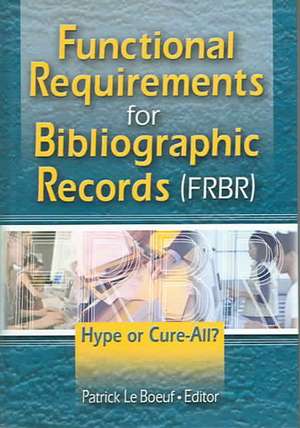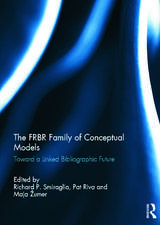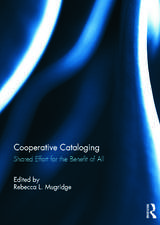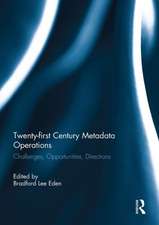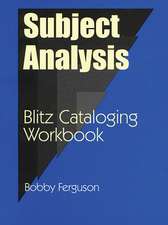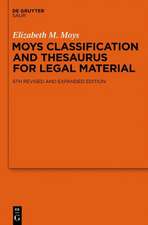Functional Requirements for Bibliographic Records (FRBR): Hype or Cure-All
Editat de Patrick Le Boeufen Limba Engleză Hardback – 30 iun 2005
In 1998, Functional Requirements for Bibliographic Records (FRBR) was a conceptual model promoted by the International Federation of Library Associations and Institutions (IFLA) as being the recommended new advancement in cataloging. As libraries strive to serve their users better in the coming years, questions remain as to whether FRBR may provide an answer on how to improve cataloging systems. Functional Requirements for Bibliographic Records (FRBR): Hype or Cure-All? explores not only the theoretical issues, such as the concept of "works" and the bibliographic relationships of musical works, but also provides a unique survey of most of the systems that actually implement FRBR such as the AustLit Gateway. This book describes the challenges that accompany implementation of FRBR, and how this abstract approach to cataloging can be a useful, practical tool to help improve library systems.
Functional Requirements for Bibliographic Records (FRBR): Hype or Cure-All? clearly explains the concepts, ideas, and practical applications of FRBR. The book is comprised of four major sections. A chronological section explains how FRBR was developed and how it will evolve in the future; a theoretical section reviews how FRBR analyzes different types of library materials; a practical aspects section examines how some systems actually use FRBR; and lastly, a section that explains an alternative to FRBR - the XOBIS project - which shows that other solutions are possible to meet future cataloging challenges.
Functional Requirements for Bibliographic Records (FRBR) explores:
- innovative features, including the "Semantic Web" activities
- future evolutions in cataloging
- alternatives to FRBR
- the history of IFLA Functional Requirements for Bibliographic Records Study
- an updated description of the entity-relationship model being developed by the Working Group to extend the FRBR model to cover authority data
- key aspects of the FRBR and FRANAR models that will need to be re-examined
- the concept of expression
- the cataloging of hand press materials
- the AustLit Gateway
- musical works in the FRBR model
- the Paradigma Project at the National Library of Norway
- the FRBR and the performing arts
- oral traditions and FRBR
- the design of future systems
- the European FRBR research initiative
- FRBRizing OCLC's WorldCat
- the IFPA software and application interfaces
- the Library of Congress's FRBR Display Tool
- XOBIS - metadata - the critical bridge between content and sophisticated access
| Toate formatele și edițiile | Preț | Express |
|---|---|---|
| Paperback (1) | 273.88 lei 6-8 săpt. | |
| Taylor & Francis – 30 iun 2005 | 273.88 lei 6-8 săpt. | |
| Hardback (1) | 769.90 lei 6-8 săpt. | |
| Taylor & Francis – 30 iun 2005 | 769.90 lei 6-8 săpt. |
Preț: 769.90 lei
Preț vechi: 1157.95 lei
-34% Nou
Puncte Express: 1155
Preț estimativ în valută:
147.34€ • 153.26$ • 121.64£
147.34€ • 153.26$ • 121.64£
Carte tipărită la comandă
Livrare economică 12-26 aprilie
Preluare comenzi: 021 569.72.76
Specificații
ISBN-13: 9780789027986
ISBN-10: 0789027984
Pagini: 328
Dimensiuni: 156 x 216 x 27 mm
Greutate: 0.77 kg
Ediția:Clean
Editura: Taylor & Francis
Colecția Routledge
Locul publicării:Oxford, United Kingdom
ISBN-10: 0789027984
Pagini: 328
Dimensiuni: 156 x 216 x 27 mm
Greutate: 0.77 kg
Ediția:Clean
Editura: Taylor & Francis
Colecția Routledge
Locul publicării:Oxford, United Kingdom
Cuprins
- Dedication (Maja Zumer)
- FRBR: Hype or Cure-All? Introduction (Patrick Le Boeuf)
- The Origins of the IFLA Study on Functional Requirements for Bibliographic Records (Olivia M. A. Madison)
- Extending FRBR to Authorities (Glenn E. Patton)
- Modeling Subject Access Extending the FRBR and FRANAR Conceptual Models (Tom Delsey)
- rdfs:frbr—Towards an Implementation Model for Library Catalogs Using Semantic Web Technology (Stefan Gradmann)
- Cataloguing of Hand Press Materials and the Concept of Expression in FRBR (Gunilla Jonsson)
- The AustLit Gateway and Scholarly Bibliography: A Specialist Implementation of the FRBR (Kerry Kilner)
- Musical Works in the FRBR Model or “Quasi la Stessa Cosa”: Variations on a Theme by Umberto Eco (Patrick Le Boeuf )
- Paradigma: FRBR and Digital Documents (Ketil Albertsen and Carol van Nuys)
- “Such Stuff as Dreams Are Made On”: How Does FRBR Fit Performing Arts? (David Miller and Patrick Le Boeuf)
- Folklore Requirements for Bibliographic Records: Oral Traditions and FRBR (Yann Nicolas)
- FRBR and Cataloging for the Future (Barbara B. Tillett)
- Slovenian Cataloging Practice and Functional Requirements for Bibliographic Records: A Comparative Analysis (Zlata Dimec, Maja Zumer, and Gerhard J. A. Riesthuis)
- Implementation of FRBR: European Research Initiative (Maja Zumer)
- FRBRizing OCLC’s WorldCat (Thomas B. Hickey and Edward T. O’Neill)
- Implementing the FRBR Conceptual Approach in the ISIS Software Environment: IFPA (ISIS FRBR Prototype Application) (Roberto Sturman)
- FRBR Display Tool (Jacqueline Radebaugh and Corey Keith)
- XOBIS—An Experimental Schema for Unifying Bibliographic and Authority Records (Dick R. Miller)
- Index
- Reference Notes Included
Descriere
In 1998, Functional Requirements for Bibliographic Records (FRBR) was a conceptual model promoted by the International Federation of Library Associations (IFLA) as being the recommended new advancement in cataloging.
